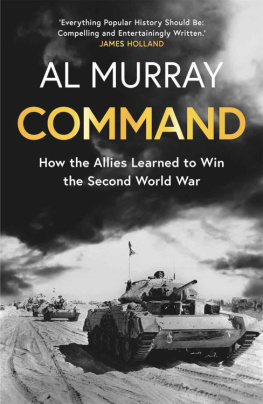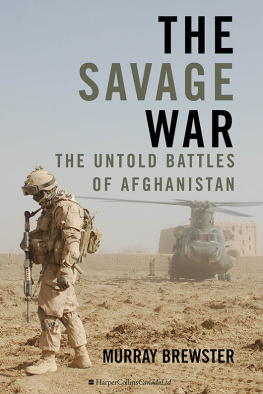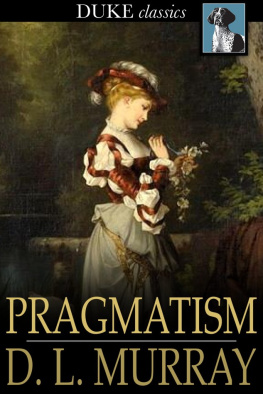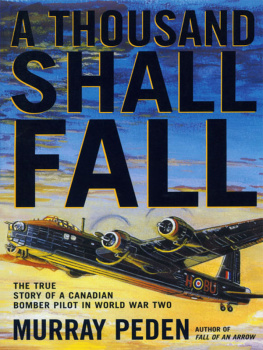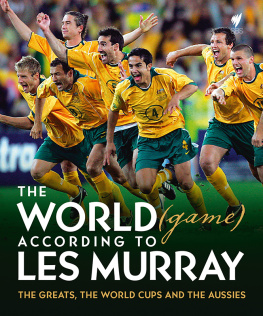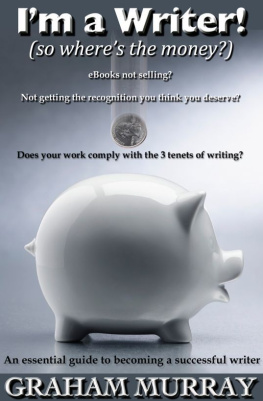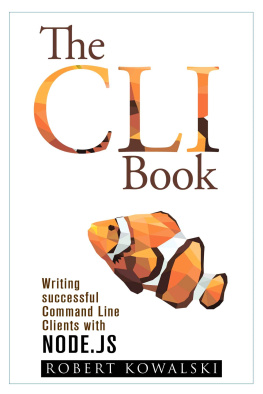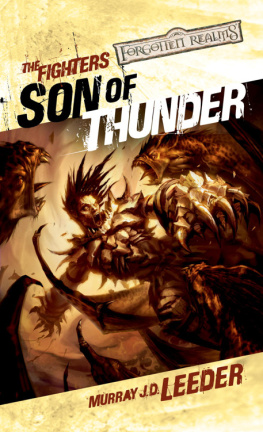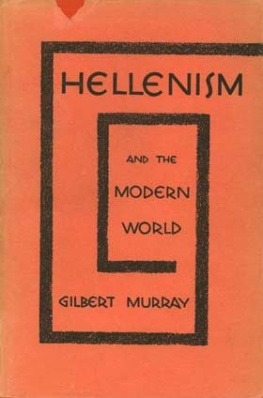Al Murray - Command: How the Allies Learned to Win the Second World War
Here you can read online Al Murray - Command: How the Allies Learned to Win the Second World War full text of the book (entire story) in english for free. Download pdf and epub, get meaning, cover and reviews about this ebook. year: 2022, publisher: Headline, genre: History. Description of the work, (preface) as well as reviews are available. Best literature library LitArk.com created for fans of good reading and offers a wide selection of genres:
Romance novel
Science fiction
Adventure
Detective
Science
History
Home and family
Prose
Art
Politics
Computer
Non-fiction
Religion
Business
Children
Humor
Choose a favorite category and find really read worthwhile books. Enjoy immersion in the world of imagination, feel the emotions of the characters or learn something new for yourself, make an fascinating discovery.
Command: How the Allies Learned to Win the Second World War: summary, description and annotation
We offer to read an annotation, description, summary or preface (depends on what the author of the book "Command: How the Allies Learned to Win the Second World War" wrote himself). If you haven't found the necessary information about the book — write in the comments, we will try to find it.
Al Murray: author's other books
Who wrote Command: How the Allies Learned to Win the Second World War? Find out the surname, the name of the author of the book and a list of all author's works by series.
Command: How the Allies Learned to Win the Second World War — read online for free the complete book (whole text) full work
Below is the text of the book, divided by pages. System saving the place of the last page read, allows you to conveniently read the book "Command: How the Allies Learned to Win the Second World War" online for free, without having to search again every time where you left off. Put a bookmark, and you can go to the page where you finished reading at any time.
Font size:
Interval:
Bookmark:

Copyright 2022 Al Murray
The right of Al Murray to be identified as the Author of the Work has been asserted by him in accordance with the Copyright, Designs and Patents Act 1988.
Apart from any use permitted under UK copyright law, this publication may only be reproduced, stored, or transmitted, in any form, or by any means, with prior permission in writing of the publishers or, in the case of reprographic production, in accordance with the terms of licences issued by the Copyright Licensing Agency.
First published in 2022 by Headline Publishing Group
First published as an Ebook in Great Britain
by Headline Publishing Group in 2022
Cataloguing in Publication Data is available from the British Library
Front jacket photograph AFP via Getty Images (sky @ AaiThit/Shutterstock)
Back jacket photograph The PrintCollector/Getty Images
Author photograph Pete Dadds
Jacket design by Jack Storey
Hardback ISBN: 978 1 4722 8459 4
eISBN: 978 1 4722 8461 7
HEADLINE PUBLISHING GROUP
An Hachette UK Company
Carmelite House
50 Victoria Embankment
London EC4Y 0DZ
www.headline.co.uk
www.hachette.co.uk
Contents

Pete Dadds
Al Murray is best known for his award-winning stand up alter ego the Pub Landlord, appearing on the stage, television and radio, setting the world to rights with his maroon blazer and frothing pint. Away from the Pub Landlord he has a keen interest in history, hosting several acclaimed TV history programmes, as well as the hit Second World War podcast We Have Ways of Making You Talk , alongside bestselling historian James Holland. This is his first book without any jokes in it.
Command is everything popular history should be: authoritative, full of deep wisdom and knowledge, genuinely fresh and original in approach and content, and both compelling and entertainingly written. Skilfully blending the famous names with those lesser known, he examines each in a completely fresh light, focussing on differing aspects that collectively offer a satisfyingly comprehensive whole that takes the reader on a journey across a wide range of landscapes, theatres and battles. It is an utter joy to read from start to finish. James Holland
With his trademark combination of humour and deep-thinking - an iron fist in a velvet glove - Al Murrays brilliantly incisive debut history forces us to think again about the nature of Command and how the Allies were able to turn disaster into triumph in World War II. Quirky, original and hard-hitting, it is as enjoyable to read as it is instructive. Saul David
Command is a stunning achievement. This is a book that sucks you in from the first page. Deeply incisive, each paragraph brings a new revelation. Al Murrays writing is as original and his conclusions as controversial as the generals he depicts. At the end of each chapter, you are left exhaling with a sense of I didnt expect that. Peter Caddick-Adams
The Pub Landlords Book of British Common Sense
The Pub Landlord Says Think Yourself British
Great British Pub Quiz Book
Watching War Films with my Dad
A unique analysis of the greatest commanders who helped the allies win the Second World War, written by one of the UKs best loved comedians and commentators. He also loves history.
Al Murrays passion for military history and the Second World War in particular has always been a duel passion with his comedy and was brought to the fore with several acclaimed and award winning television shows and the recent huge success of his podcast We Have Ways of Making You Talk which he hosts fellow bestselling military author James Holland . The podcast has built up a loyal, nationwide fanbase and has given birth to its own annual three-day festival. In his first serious narrative book, Command showcases Al Murrays passion for this pivotal period in the Twentieth Century, as he writes an engaging, entertaining and sharp analysis of the key allied military leaders in the conflict.
Command highlights the performance and careers of some of the key protagonists who commanded armies, as well as the lesser-known officers who led divisions, regiments and even battalions for the British, Commonwealth and United States of American armies. By showcasing each combat commander across every theatre of operations the allies fought in, Murray tells the story of how the Western Allies rebounded from early shocking defeats (Dunkirk and Pearl Harbor) to then victories (El Alamein and D-Day) in its efforts to defeat the Axis forces of Nazi Germany and Japan, and what that tells us about the characters and the challenges that faced them. Command will be the book all fans of Second World War History will want to buy who appreciate a true enthusiast of the genre who has something new and compelling to say.
To the Independent Company
for keeping us company
Tunis fallen?! Ups a daisy! Had we ordinary layabouts defeated the formidable German army? Spike Milligan, Monty: His Part in My VictoryIf you want the truth, go to a comedian. Spike Milligans ribald memoirs of his time as a conscripted man in the Royal Artillery make an interesting point. As part of the First Army which had fought a rushed action to try to stop the Germans establishing themselves in Tunisia, and then tried to squeeze the German armies between itself and Eighth Army, advancing from the east Milligans battery had been in action almost constantly, and when not fighting, it had been on the move. His memoirs fondly recreate the easy humour in the battery and clearly illustrate the mens attitudes to the war. Its quite clear that patriotism is low down their list for fighting. From starting out without any equipment, shouting Bang! as they drilled at their guns, Milligan and his fellow layabouts went on to take part in the climactic battles which ended the war in North Africa, then on into Italy for all Milligans joking, blowing raspberries and flicking Vs at the enemy, he knew that he and his friends were part of a war-winning machine. How had this happened? Featuring large in Milligans experience was Major Chater-Jack, whose care and concern for his men, conscripts fighting in a war they had not sought (certainly not Milligan, who had done everything he could to avoid turning up to his depot), was a huge factor in transforming these civilians into soldiers. To Bombardier Milligan, command mattered.
The Second World War is an endlessly peelable onion, a subject that seems to offer no boundaries, that throws up new mysteries and revelations as well as mythologies even as it glides slowly further into the past. Even knowing where or when to start is daunting. Picking a subject, finding its edges, satisfying oneself with definitions and parameters is nigh on impossible. But there is a simple question that hangs over the war: how did the Allies win? And, more importantly, given the answer that some feel is self-evident: by economic and industrial might take on three imperiums each with a larger economy than yours and you are surely done for how did they learn to apply those obvious advantages against foes who were far more interested in waging war, at least at the outset, than they were? With so much stuff at their disposal, was the Allies victory not assured, regardless of how their men were led?
If it is anything at a glance, the Second World War is a war of hardware, of tanks, planes, ships and factories. A war of materiel, of resources. And a war of technology. The dazzling speed of development before and during the war of weapons technology from the Gloster Gladiators Faith , Hope and Charity that were used to defend Malta in 1940 to the V-2 ballistic missiles raining down on London only four years later, as well as the unprecedented and unimagined power of the atomic bomb goes a long way to make the case that this was a war of machines and of the economies that produced those machines. And given the effort that the Western Allies put into destroying and disrupting German industry, its clear that this was how they saw the war: they would use their own technology and industry to deny the Germans the use of theirs. The result was that 45 per cent of German industry was given over to producing aircraft, a clear indication of the extent to which the strategic bombing campaign was effective in defeating Nazi Germany. Germanys industrial opportunities were dictated by Allied bombing and blockades. Again this is an argument about stuff, tech, materiel.
Next pageFont size:
Interval:
Bookmark:
Similar books «Command: How the Allies Learned to Win the Second World War»
Look at similar books to Command: How the Allies Learned to Win the Second World War. We have selected literature similar in name and meaning in the hope of providing readers with more options to find new, interesting, not yet read works.
Discussion, reviews of the book Command: How the Allies Learned to Win the Second World War and just readers' own opinions. Leave your comments, write what you think about the work, its meaning or the main characters. Specify what exactly you liked and what you didn't like, and why you think so.

